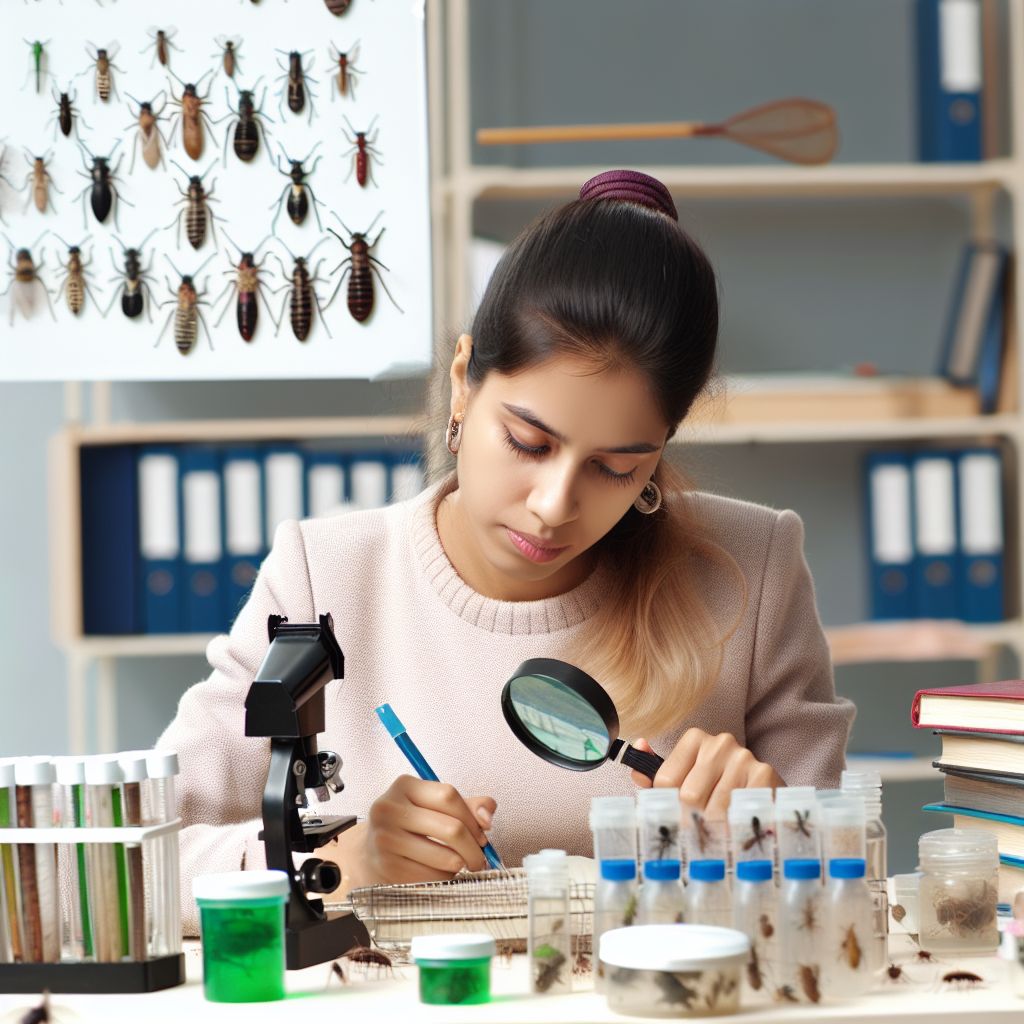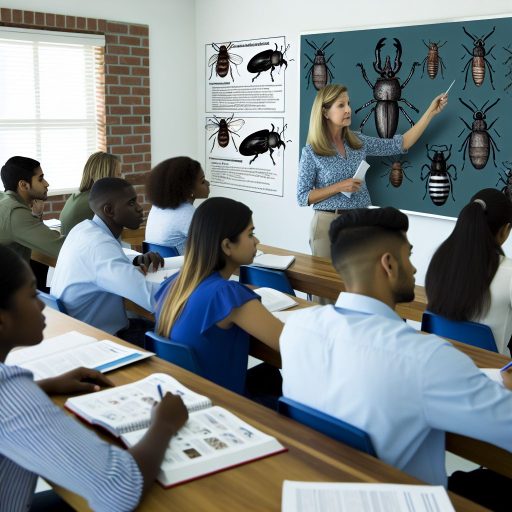Introduction:
An entomologist is a scientist who studies insects.
These experts also study insect behavior, biology, and ecosystems.
They play a crucial role in understanding and protecting our environment.
To become an entomologist in the USA, one must follow a specific educational path.
This includes obtaining a bachelor's degree, pursuing a master's degree or Ph.D.
Gaining hands-on experience through research and internships is also essential.
Bachelor’s Degree:
– Choose a relevant major such as entomology, biology, or ecology
– Take courses in entomology, biology, and chemistry
– Participate in research opportunities or internships related to entomology
To become an entomologist in the USA, starting with a bachelor’s degree is crucial.
It is recommended to choose a major that is closely related to entomology, such as entomology itself, biology, or ecology.
These majors provide a strong foundation in the study of insects and their ecosystems, which are essential for a career in entomology.
In addition to choosing a relevant major, taking specific courses is essential.
Courses in entomology, biology, and chemistry are fundamental for understanding the principles and processes that govern insect biology, behavior, and interactions with the environment.
These courses provide a comprehensive understanding of the field and prepare students for advanced studies in entomology.
Furthermore, participating in research opportunities or internships related to entomology is highly beneficial.
These experiences allow students to gain practical knowledge and skills in the field, such as conducting research, collecting and analyzing data, and working with insect specimens.
They also provide valuable networking opportunities and insights into potential career paths within entomology.
Obtaining a bachelor’s degree with a focus on entomology or related fields, taking relevant courses, and gaining practical experience through research opportunities or internships are essential steps in the educational path to becoming an entomologist in the USA.
Graduate Degree:
After completing your undergraduate studies, the next step in becoming an entomologist in the USA is to pursue a graduate degree.
Transform Your Career Today
Unlock a personalized career strategy that drives real results. Get tailored advice and a roadmap designed just for you.
Start NowA Master’s degree in entomology or a related field is typically required for entry-level positions in the field.
During your graduate studies, you will have the opportunity to delve deeper into the study of insects and their behavior.
You will also have the chance to conduct original research or a thesis on a specific aspect of entomology that interests you.
One of the key components of a graduate degree in entomology is gaining hands-on experience.
This can be achieved through fieldwork, where you observe insects in their natural habitats, or lab work, where you conduct experiments and analyze data.
Collaborating with other entomologists and researchers is also crucial during your graduate studies.
This will not only help you expand your knowledge and skills but also provide you with networking opportunities within the entomology community.
Overall, pursuing a graduate degree in entomology will equip you with the necessary expertise and experience to pursue a career as an entomologist in the USA.
It will also enable you to contribute to the scientific understanding and conservation of insects and their ecosystems.
- Pursue a Master’s degree in entomology or a related field
- Conduct research or thesis on a specific aspect of entomology
- Gain experience through fieldwork, lab work, and collaborations with other entomologists
Gain More Insights: Collaborative Efforts in Agricultural and Environmental Science
Specialization
- Decide on a specific area of entomology to specialize in.
- Consider areas such as medical entomology, agricultural entomology, or forensic entomology.
- Take additional courses or certifications to further specialize in chosen field.
Choosing a specialization in entomology is a crucial step in your educational path.
By focusing on a specific area, you can deepen your knowledge and expertise in that particular field.
Here are some tips to help you decide on your specialization:
1. Decide on a specific area of entomology to specialize in: Take some time to explore the different branches of entomology and identify which area interests you the most.
Whether it’s studying the insects that transmit diseases in medical entomology, or working on pest management solutions in agricultural entomology, choosing a focus will help guide your academic and professional endeavors.
2. Consider areas such as medical entomology, agricultural entomology, or forensic entomology: Each subfield of entomology offers unique opportunities for research and application.
Medical entomologists study insects that impact human health, while agricultural entomologists focus on insects that affect crops and livestock.
Forensic entomologists use insects to assist in criminal investigations.
Think about which of these areas aligns best with your interests and career goals.
3. Take additional courses or certifications to further specialize in your chosen field: Once you have identified your specialization, consider taking advanced courses or pursuing certifications that will enhance your expertise.
Transform Your Career Today
Unlock a personalized career strategy that drives real results. Get tailored advice and a roadmap designed just for you.
Start NowFor example, if you are interested in agricultural entomology, you may want to take courses on integrated pest management or crop protection.
These additional credentials can make you a more competitive candidate for research positions or industry jobs in your chosen field.
Specialization in entomology allows you to focus your studies and research on a specific area of interest, making you a more knowledgeable and skilled entomologist.
Take the time to explore the different subfields, choose a specialization that aligns with your goals, and pursue additional education to enhance your expertise.
By becoming a specialist in a particular area of entomology, you can make significant contributions to the field and advance your career in exciting and meaningful ways.
Uncover the Details: Work-Life Balance for Dairy Scientists
Networking
Networking is a crucial aspect of pursuing a career in entomology.
By actively engaging with other professionals in the field, you can gain valuable insights.
You can expand your knowledge and create opportunities for collaboration.
Attend Conferences, Workshops, and Seminars in Entomology
One of the best ways to network with other entomologists is by attending conferences, workshops, and seminars dedicated to entomology.
These events bring together experts, researchers, and enthusiasts in the field.
They provide a platform for sharing knowledge and building connections.
By participating in these events, you can learn about the latest research, trends, and developments in entomology.
You may also have the opportunity to present your own research, receive feedback, and connect with potential collaborators or mentors.
Join Professional Organizations
Joining professional organizations such as the Entomological Society of America can greatly enhance your networking opportunities.
These organizations often host events, conferences, and meetings where you can interact with other professionals in the field.
Membership in such organizations also provides access to valuable resources, publications, and job postings.
Being part of a professional network can help you stay updated on industry news, advancements, and opportunities for career growth.
Build Connections with Other Entomologists
Building connections with other entomologists, researchers, and professionals in the field is essential for expanding your network.
Reach out to experts in the field, attend networking events, and seek mentorship opportunities.
Transform Your Career Today
Unlock a personalized career strategy that drives real results. Get tailored advice and a roadmap designed just for you.
Start NowBy fostering meaningful relationships with others in the entomology community, you can exchange ideas, seek advice, and collaborate on research projects.
These connections can also lead to job opportunities, research grants, and other professional advancements.
Networking plays a vital role in becoming a successful entomologist.
By actively engaging with other professionals, attending events, and joining organizations, you can broaden your knowledge.
Establishing valuable connections paves the way for a rewarding career in entomology.
- Attend conferences, workshops, and seminars in entomology.
- Join professional organizations such as the Entomological Society of America.
- Build connections with other entomologists, researchers, and professionals in the field.
Discover More: Dairy Scientist’s Role in Milk Pasteurization
Fieldwork and Research:
Fieldwork is an essential component of an entomologist’s work.
It involves going out into the field to observe insects in their natural habitats.
By studying insects in their environment, entomologists can gain a better understanding of their behavior.
They also learn about ecological roles and interactions with other organisms.
Collaboration is key in the field of entomology.
Entomologists often work together on research projects to tackle complex questions and challenges.
By collaborating with colleagues, entomologists can leverage their combined expertise and resources.
This collaboration leads to new discoveries and advancements in the field.
Once entomologists have conducted their research and analyzed their data, the next step is publishing their findings.
Publishing is important because it allows entomologists to share their discoveries.
By disseminating research, they contribute to the collective knowledge and understanding of insects.
- Conduct fieldwork to study insects in their natural habitats
- Collaborate with other entomologists on research projects
- Publish research findings in scientific journals to contribute to the field of entomology
Gain More Insights: Common Plant Diseases Plant Pathologists Study

Continuing Education:
Stay updated on the latest developments and research in entomology.
Transform Your Career Today
Unlock a personalized career strategy that drives real results. Get tailored advice and a roadmap designed just for you.
Start NowAttend continuing education courses or workshops.
Consider pursuing a Ph.D. or advanced certifications to further enhance expertise in entomology.
Continuing education is crucial for entomologists to stay abreast of the latest trends and advancements in the field.
By engaging in continuous learning, entomologists can broaden their knowledge base, develop new skills, and stay competitive in the job market.
Attending workshops, seminars, and conferences focused on entomology is a great way to network with other professionals in the field and gain exposure to cutting-edge research.
These events provide valuable opportunities to learn from experts, collaborate on projects, and exchange ideas with peers.
Furthermore, pursuing a Ph.D. in entomology or obtaining advanced certifications can significantly enhance an entomologist’s expertise and credibility.
A Ph.D. program typically involves in-depth research, specialized coursework, and the development of advanced analytical and critical thinking skills.
Advanced certifications, such as the Board Certified Entomologist (BCE) designation, demonstrate a commitment to excellence and a high level of competency in entomology.
These credentials can open up new career opportunities, increase earning potential, and garner respect within the entomological community.
In addition to formal education, entomologists can also benefit from hands-on training and practical experience.
Working in research labs, collaborating on field studies, and participating in volunteer programs can provide valuable insights and help entomologists apply theoretical knowledge to real-world situations.
By continuously seeking opportunities for learning and professional development, entomologists can stay at the forefront of their field and make meaningful contributions to entomological research, conservation efforts, and pest management strategies.
Job Prospects:
As you embark on your journey to become an entomologist, it’s essential to explore the various job opportunities that await you.
One of the key sectors where entomologists find employment is academia, where they teach and conduct research.
Consider looking for positions in government agencies that focus on areas like agriculture, public health, or conservation.
Research institutions often hire entomologists to contribute to scientific studies and advancements in the field.
Private companies also seek entomologists to help with product development, pest management, and environmental consulting.
Some specific roles you may want to consider include research entomologist, who primarily focuses on lab-based studies.
Another option is to become an extension entomologist, who works with farmers and the community to address insect-related issues.
Transform Your Career Today
Unlock a personalized career strategy that drives real results. Get tailored advice and a roadmap designed just for you.
Start NowIf you are interested in practical applications, you could pursue a career as a pest control specialist.
When searching for job openings, ensure they align with your specialization and interests in entomology.
Keep an eye on job boards, university websites, and professional organizations for relevant opportunities in the field.
Passion and Dedication in Entomology
After reviewing the detailed educational path to becoming an entomologist in the USA, it’s clear that passion, dedication, and continuous learning are essential aspects of this field.
Aspiring entomologists must be willing to invest time and effort into their education and research to succeed in this fascinating area of study.
By emphasizing the importance of passion and dedication, aspiring entomologists will be more motivated to explore the world of insects and contribute valuable knowledge to the scientific community.
This field offers endless opportunities for research, discovery, and making a positive impact on our understanding of the natural world.
I encourage all individuals with a passion for entomology to pursue their dreams and make a difference in the world of science.
By following the educational path outlined in this blog post and remaining dedicated to their studies, aspiring entomologists can make significant contributions to the field.
They can help shape our understanding of insects and their ecosystems.
Additional Resources
Agricultural and Food Scientists : Occupational Outlook Handbook …
[E-Books for Sale]
The Big Book of 500 High-Paying Jobs in America: Unlock Your Earning Potential
$19.99 • 500 High-Paying Jobs • 330 pages
Explore 500 high-paying jobs in America and learn how to boost your career, earn more, and achieve success!
See All 500 High-Paying Jobs of this E-Book
1001 Professions Without a Degree: High-Paying American Jobs You Can Start Now
$19.99 • 1001 Professions Without a Degree • 174 pages
Discover 1001 high-paying jobs without a degree! Unlock career tips, skills, and success strategies for just $19.99!




